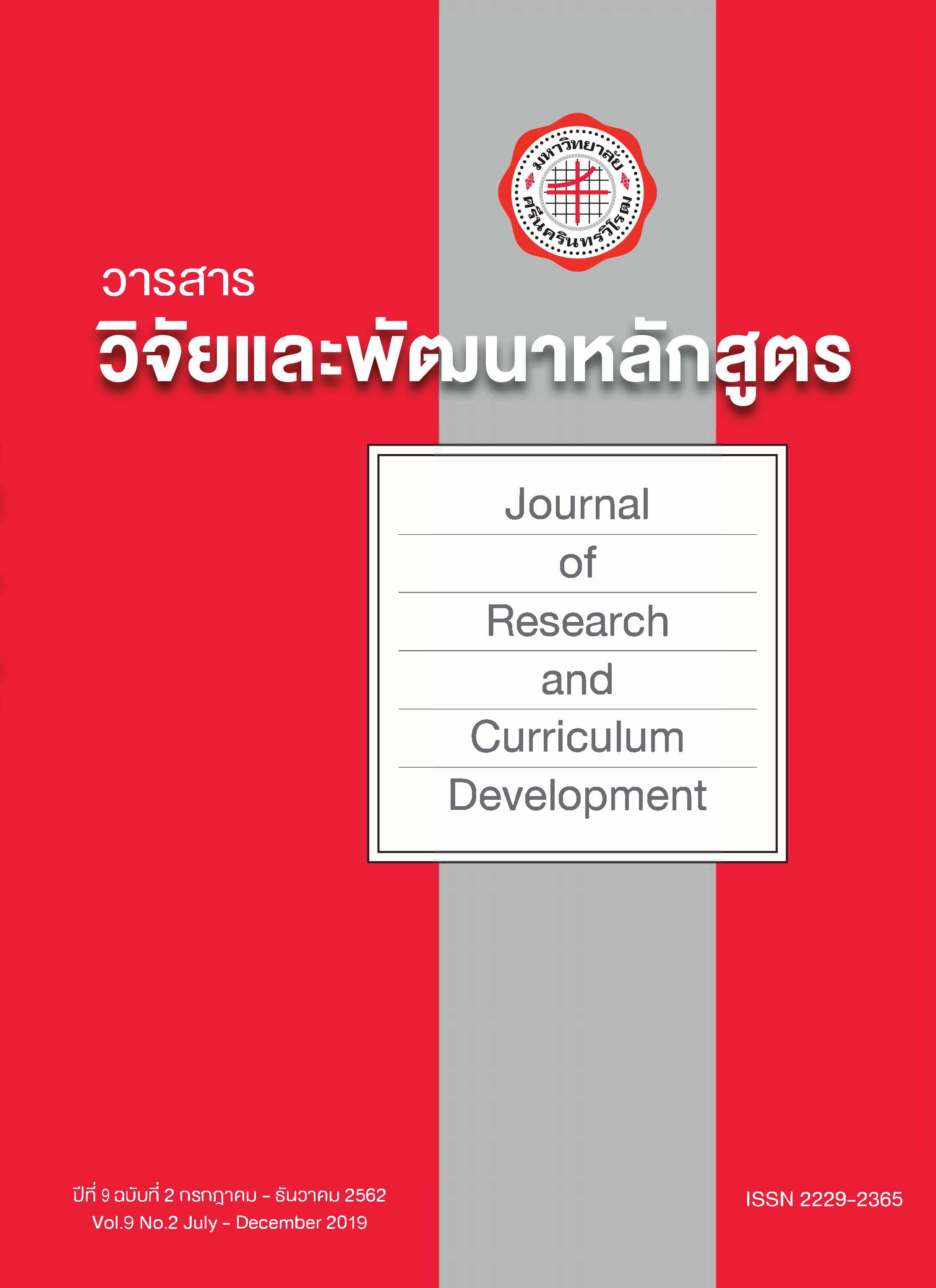การสร้างชุมชนวิชาชีพบนฐานโรงเรียน: บทเรียนจากโครงการโรงเรียนสุขภาวะ
Keywords:
School-based professional community, Heathy school, School-based professional community, Heathy schoolAbstract
ปัจจุบันแนวโน้มการปฏิรูปโรงเรียนให้ความสำคัญกับความเข้มแข็งในการทำงานแบบมืออาชีพของครู ซึ่งการวิจัยครั้งนี้มุ่งศึกษากระบวนการพัฒนาตนเองของโรงเรียน และวิธีการแทรกเสริมที่มีประสิทธิภาพในการเปลี่ยนแปลงโรงเรียน จากบทเรียนการสร้างชุมชนวิชาชีพบนฐานโรงเรียนในโครงการโรงเรียนสุขภาวะ ดังนั้นเพื่อให้ได้สารสนเทศเชิงลึก การรวบรวมข้อมูลจึงใช้วิธีการสนทนากลุ่มแบบเจาะจงกับกลุ่มผู้อำนวยการโรงเรียน จำนวน 20 คน และครู จำนวน 10 คน การสัมภาษณ์เชิงลึกกับประธานคณะกรรมการสถานศึกษา จำนวน 5 คน และการสังเคราะห์เอกสารของโครงการ ผลการวิจัยพบว่า การพัฒนาโรงเรียนตามองค์ประกอบของการสร้างชุมชนวิชาชีพบนฐานโรงเรียนเป็นรูปแบบการเปลี่ยนแปลงโรงเรียนที่มีประสิทธิภาพ โดยผู้อำนวยการโรงเรียนเป็นผู้นำการเปลี่ยนแปลงจากภายในที่มีบทบาทเอื้ออำนวยกิจกรรมการพัฒนาครูในรูปแบบชุมชนการเรียนรู้เชิงวิชาชีพ และการมีส่วนร่วมทางบวกกับผู้ปกครองและชุมชนในการเสริมสร้างการเรียนรู้ของนักเรียน
References
ประวิต เอราวรรณ์. (2562). การวิจัยและการพัฒนาองค์การในโรงเรียน (พิมพ์ครั้งที่ 3). กรุงเทพฯ : สำนักพิมพ์ จุฬาลงกรณ์มหาวิทยาลัย.
ประวิต เอราวรรณ์ และวราพร เอราวรรณ์. (2560). รายงานการประเมินผลโครงการเสริมสร้างพลังอำนาจการจัดการศึกษาที่สร้างสุขภาวะในโรงเรียน. วารสารการวัดผลการศึกษา มหาวิทยาลัยมหาสารคาม, 23(2), 104-113.
มูลนิธิสถาบันวิจัยระบบการศึกษา. (2562). รายงานฉบับสมบูรณ์โครงการพัฒนาศักยภาพศูนย์เรียนรู้ด้าน สุขภาวะในโรงเรียนและเสริมสร้างพลังเครือข่ายการจัดการศึกษาที่สร้างสุขภาวะในโรงเรียน. กรุงเทพฯ: มูลนิธิสถาบันวิจัยระบบการศึกษา.
สำนักงานกองทุนสนับสนุนการสร้างเสริมสุขภาพ. (2546). นักสร้างเสริมสุขภาพต้องทำงานนอกกรอบของวงการ สาธารณสุขแบบเดิม. สืบค้นวันที่ 20 มิถุนายน 2566 จาก https://www.thaihealth.or.th
อุทุมพร จามรมาน. (2531). การวิเคราะหขอมูลเชิงคุณลักษณะ. เลมท่ี 4. กรุงเทพมหานคร: สํานักพิมพ
จุฬาลงกรณมหาวิทยาลัย
Bandura, A. (1986). Social foundation of thought and action: A Social cognitive
theory. Englewood Cliffs, NJ: Prentice Hall.
Barber, M. & Mourshed, M., (2007). How the world’s best-performing school systems come out on top. London: McKinsey & Company, Social Sector.
Blanchard, K. H., Carlos, J. P., & Randolph, A., (1999). The 3 keys to empowerment:
Release the power within people for astonishing results. San Francisco: Berrett-Koehler Publishers.
Blasé, J., & Blasé, J. R. (1994). Empowering teachers what successful principals do.
Thousand Oaks, CA: Corwin Press.
Bohm, D., Factor, D., & Garrett, P. (1991). Dialogue—A proposal. Retrieved June 20, 2019,
from https://www.david-bohm.net/dialogue/dialogue_proposal.html
Cohen, L., Manion, L. & Morrison, K. (2000). Research methods in education. 5th edition. London: Routledge Falmer.
Creswell, J. W., & Creswell, J. D. (2018). Research design: Qualitative, quantitative and mixed methods approaches (5th ed.). Thousand Oaks, CA: Sage.
Erawan, P. (2015). Healthy Schools Promotion : An Experience in Thailand. Procedia-Social and Behavioral Sciences, 186, 513 – 521.
Hopkins, D. (2001). School improvement for real. New York: RoutledgeFalmer.
Jones, L., Stall, G., & Yarbrough, D. (2013). The Importance of Professional Learning Communities for School Improvement. Creative Education, 4(5), 357-361.
Klecker, B. M., & Loadman, W. E. (1998, November). Empowering elementary teachers
in restructuring schools: Dimensions to guide the mission. Paper presented at the annual meeting of the Mid-South Educational Research Association,
New Orleans.
Krippendorff, K. (2004). Content analysis: An introduction to its methodology. 2nd Ed. Thousand Oaks, CA: Sage.
Krueger, R.A. (1994). Focus groups: A practical guide for applied research. 2nd edition. Thousand Oaks, CA: Sage.
Kruse, S. D., Louis, K. S., & Bryk, A. S. (1995). An emerging framework for analyzing school- based professional community. In K. S. Louis & S. D. Kruse (Eds.), Professionalism and community: Perspectives on reforming urban schools (p.2342). Thousand Oaks, CA: Corwin Press, Inc.
Kumar, K. (1993). Rapid appraisal methods. Washington, D.C.: The World Bank.
Lambert, L.G., Conklin, M.T. & Meyer, M.K. (2001). Parents’ beliefs toward their children’s participation in the national school lunch program: Results of focus group discussions guided by the theory of reasoned action. Topics in Clinical Nutrition, 16, (4), 11-17.
Little, J. W. (2006). Professional Community and Professional Development in the Learning- Centered School. Washington, DC: National Education Association.
Meyers, C., & Jones, T. B. (1993). Promoting active learning: Strategies for the college classroom. San Francisco, CA: Jossey-Bass Inc.
Morgan, D.L. (1988). Planning a focus group. Focus group Kit 2. Thousand Oaks, CA: Sage.
Owens, R. G. (1987). Organizational behavior in education (3rd ed.). New Jersey:
Prentice Hall.
Schmuck, R. A., & Runkel, P. J. (1985). The Hand book of organization development
in schools (3rd ed.). Palo Alto, CA: Mayfield Publishing Company.
Scott, C. D., & Jaffe, D. T. (1991). Empowerment: building a committed workforce.
California: Kogan Page.
Stewart, D. W. & Shamdasani, P. N. (1991). Focus Groups: Theory and Practice. Beverly Hills, CA: Sage.
Tracy, D. (1990). 10 Steps to empowerment: A common-sense guide to managing people. New York: William Morrow.
Vondal, P. (2010). Using Rapid Appraisal Options Performance Monitoring & Evaluation TIPS, Washington DC, USAID Center for Development Information and Development Evaluation. Retrieved from https://transition.usaid.gov/policy/evalweb/documents/TIPS-UsingRapidAppraisalMethods.pdf (accessed March 21, 2019).
York-Barr, J., Sommers, W. A., Ghere, G. S., & Montie, J. (2001). Reflective practice to improve schools: An action guide for educators. Thousand Oaks, Calif.: Corwin Press.
Zimmerman, M. A. (2000). Empowerment theory: handbook of community psychology.
New York: Academic/Plenum Publishers.
Zimmerman, M. A., & Rappaport, J. (1988). A citizen participation, perceived control,
and psycho-logical empowerment, American Journal of Community Psychology,
1(5), 121-48.





